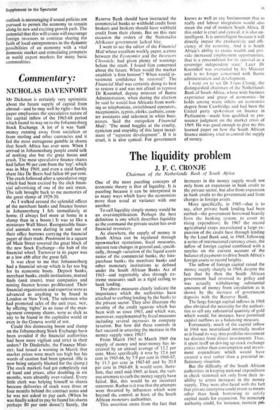Commentary:
NICHOLAS DAVENPORT
Mr Dickman is certainly very optimistic about the future supply of capital from abroad—and he may well be right—but his paper emphasises the speculative nature of the capital inflow of the 1965-68 period which found its way on to the Johannesburg Stock Exchange. A lot of it was 'funk' money running away from socialism or from sterling and other currencies and it fed the most outrageous gamble in shares that South Africa has ever seen. When I arrived in Johannesburg people could talk of nothing else but the great boom and crash. The most speculative finance shares had fallen 90 per cent from the 'top'. which was in May 1969, and even a staid family share like De Beers had fallen 60 percent. The crash followed after a speculative orgy which had been excited by the slick finan- cial advertising of one of the unit trusts. The talk brought back to me memories of the great slump of 1929-30.
As I walked around the splendid offices of the merchant banks and finance houses in Johannesburg I felt immediately at home. (I always feel more at home in a slump than in a boom.) It was so like a miniature Wall Street. Recognisable finan- cial animals were darting in and out of their office burrows carrying the financial paper of their trade. Prominent in a square off Main Street towered the great block of the new Stock Exchange—the hub of the financial wheel. Turnover in its paper was at a low ebb after the great fall.
It was clear to me that Johannesburg had a financial set-up which is far too big for its economic boots. Deposit banks, merchant banks, credit institutions, mutual finds (unit trusts), trust companies and mining finance houses proliferated. Their financial organisation and expertise were as advanced as anything to be found in London or New York. The salesmen who had promoted sales of the unit trust, NGF, by offering 'rights' in an issue of the man- agement company shares, were as slick as any to be found in the capitalist world or even in the Geneva world of los.
Could this distressing boom and slump on the Johannesburg Stock Exchange have been avoided if the financial authorities had been more vigilant and strict in their orders? Dr Diederichs, the Finance Mini- ster, had issued a warning in March that market prices were much too high but his words of caution had been ignored. (He is now being unjustly blamed for the slump.) The stock markets had got cotnpletely out of hand and prices, after doubling in six months, were absurdly over-valued. Every little clerk was helping himself to shares because deliveries of stock were three or four months behind the contract notes and he was not asked to pay cash. (When he was finally asked to pay he found his shares perhaps 80 per cent down!) Surely, the Reserve Bank should have instructed the commercial banks to withhold credit from brokers and brokers should have withheld credit from their clients. But on this rare occasion the orders of the Nationalist Afrikaner government lacked bite.
I went to see the editor of the Financial Mail whose excellent weekly paper, a cross between the Economist and the Investors Chronicle, had given plenty of warnings before the crash. I found him concerned about the future. When would the market establish 'a firm bottom'? When would in- vestment confidence be restored? The Financial Mail was certainly doing its best to restore it and was not afraid to reprove Dr Koornhof, deputy minister of Bantu Administration, when during the election he said he would ban Africans from work- ing as telephonists, switchboard operators, receptionists, typists, clerks, cashiers, coun- ter assistants and salesmen in white busi- nesses. Said the outspoken Financial Mail: 'The mind boggles at the cruelty, cynicism and stupidity of this latest instal- ment of "separate development". If it is cruel, it is also cynical. For government knows as well as any businessman that to really end labour integration would also mean the end of modern South Africa. If this order is cruel and cynical, it is also un- intelligent. It is unintelligent because it will directly impair the productivity and effi- ciency of the economy. And it is South Africa's ability to create wealth and pro- vide increased employment opportunities. that is a precondition for its survival as a sovereign independent state.' Later Dr Koornhof was overruled by his Minister and is no longer concerned with Bantu administration and development.
I went on to see Dr Frans Cronje, the distinguished chairman of the Netherlands Bank of South Africa, whose wide business experience and grasp of economics—he holds among many others an economics degree from Cambridge and had been the United party spokesman on finance in Parliament—made him qualified to pro- nounce judgment on the market crisis of 1969. He was good enough to give me this learned paper on how the South African finance ministry tried to control the supply of money.






















































 Previous page
Previous page